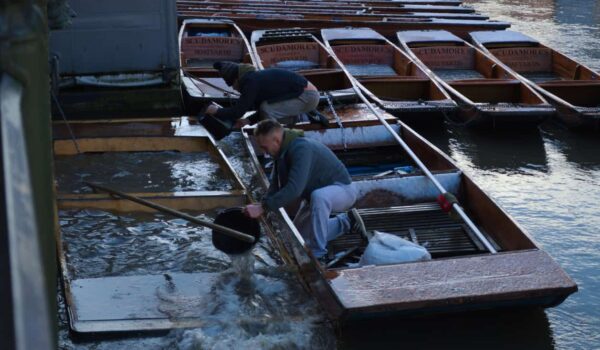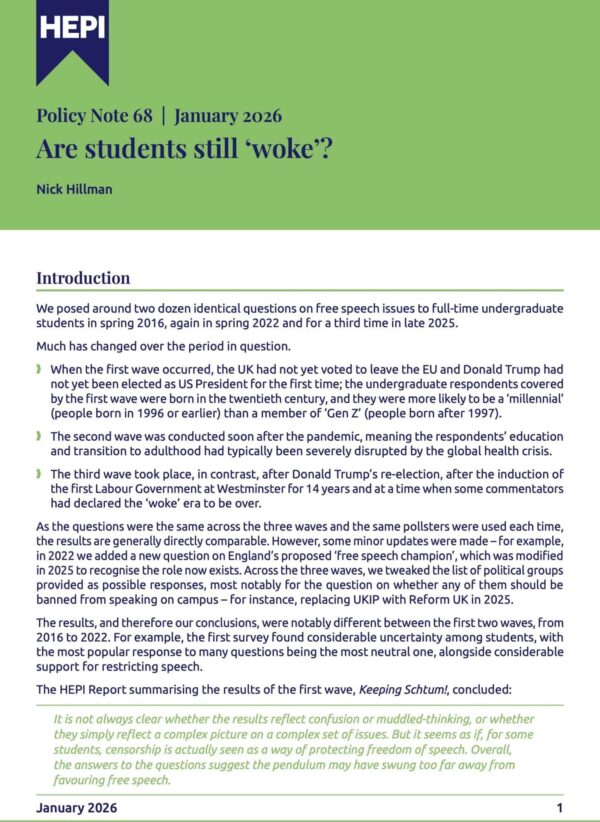What does the post-16 education and skills white paper say about access and participation?
This blog was authored by Charlotte Armstrong, Policy Manager at HEPI.
It is the second blog in HEPI’s series responding to the post-16 education and skills white paper. You can find the first blog here.
Despite the post-16 education and skills white paper devoting an entire sub-section to ‘Improving Access and Participation’, the genuine challenges facing students receive minimal attention. The skills agenda within the Government is so strong that the paper frames students, and the student experience, in terms of their potential future contribution to the economy and regional growth. This results in little attempt to understand and address the student experience and the very real challenges that students are currently facing.
A shift to the skills agenda
The Lifelong Learning Entitlement (LLE) takes up several bullet points within this section of the paper. In fact, the decision to categorise the LLE under the heading of access provides an interesting insight into the Government’s broader approach to access and participation. Considering the LLE as a subsection of this initiative reframes the focus of access from entrance to higher education to employment outcomes and progression throughout a person’s life. This shift is an idea repeated throughout the white paper that dovetails with the Government’s skills agenda. It indicates that the Government views higher education as a means to add future value to the economy and a tool through which its Industrial Strategy can be furthered. This approach leaves little room for those subjects and disciplines that fall outside the strategy, let alone for learning for its own sake.
Both modular LLE courses and the newly announced maintenance grants (as announced within the white paper, and previously at the Labour Party Conference) are available only to those studying courses that link to the Government’s wider Industrial Strategy. As may be easily guessed, this results in a list of subjects that largely dovetail with the science and technology sectors – arts and humanities subjects don’t get a look in. Tying maintenance grants to the study of pre-approved science subjects risks disincentivising students from low-income backgrounds from pursuing arts and humanities subjects – potentially entrenching bias and elitism within this sector, as well as furthering the narrative of ‘Mickey Mouse degrees’. As the costs of studying at university continue to rise, some prospective students will struggle to justify studying the subject of their choice if it means losing out on access to maintenance grants. Many of these excluded subjects are already in crisis – as the HEPI / Duolingo report The Language Crisis: Arresting Decline demonstrates, undergraduate enrolments in ‘Language & Area Studies’ have decreased by 20% in five years. Disincentivising students from taking these courses will surely only deepen this crisis further.
These criticisms do not mean the LLE and the reintroduction of maintenance grants are bad policies. The latter is a particularly welcome development that has long been campaigned for by HEPI and the National Union of Students. However, the limited nature of their current form limits the positive impact they could otherwise have. While there is no current clarification on the precise threshold that will be placed on access to maintenance grants, the Government’s lack of movement on the parental income thresholds within the student finance system likely means only a very small number of students will be eligible.
When first announcing this policy at the Labour Party conference, Education Secretary Bridget Phillipson claimed that the reintroduction of maintenance grants would ensure students spent their time at university ‘learning or training, not working every hour God sends’. This perhaps suggests that maintenance grants will be available in addition to, not instead of, the maintenance loan for those eligible students, although we keenly await the detail which will be outlined by the Chancellor in the upcoming Budget. However, this doesn’t solve the deepening financial crisis facing a large number of students in higher education – many of whom simply will not be eligible for the new maintenance grants.
HEPI’s research into the Minimum Income Standard for Students highlights how the current maximum maintenance loan covers just half of the costs faced by freshers. Furthermore, the parental income threshold for eligibility for the maximum loan is currently so out of touch that a student from a household with a single parent earning just above the minimum wage will not be eligible for the maximum loan. The Government has sought to highlight that maintenance loans will increase in line with forecast inflation for every academic year, but this is merely a continuation of the current policy and will not address the financial crisis that many students face. Plus, forecast inflation tends to be lower than actual inflation. Similarly, the promise that care leavers will automatically become eligible to receive the maximum rate of loan is also a reiteration of a policy already in place. Care leavers (and estranged students) are classified as independent and therefore are eligible for the maximum loan. However, as previously mentioned, HEPI’s research shows that this maximum loan covers only half of the costs these students will face while at university.
Postgraduate access
The inclusion of postgraduate access in the white paper is a welcome addition – and an unsurprising one when considering how this white paper has framed access in terms of career progression and skills. However, once more, the inclusion of postgraduate students within access goals falls short due to a failure to address the root causes of the widening crises for home postgraduate students in England. Postgraduate taught tuition fees now exceed the maximum postgraduate loan – meaning that a student has used up their entire loan before even considering their cost of living.
Instead of engaging with this, the paper encourages providers to include postgraduate study in their Access and Participation Plans (APP). This is, in itself, a positive development; however, without addressing the financial barriers faced by many prospective postgraduate students, this inclusion will have very limited impact.
The access and participation section of the post-16 education and skills white paper provides an insight into how this Government conceives of these issues. However, the focus on students as future employees paints a worrying picture of a Government that is more concerned with next steps than with higher education itself.







Comments
Jonathan Alltimes says:
I encourage you to write to the Secretary of State and where possible include calculations grossed up to show that you understand the estimated financial consequences for the DfE budget. It may be that fewer but larger grants are issued, as the Comprehensive Spending Review has been settled.
Reply
Add comment